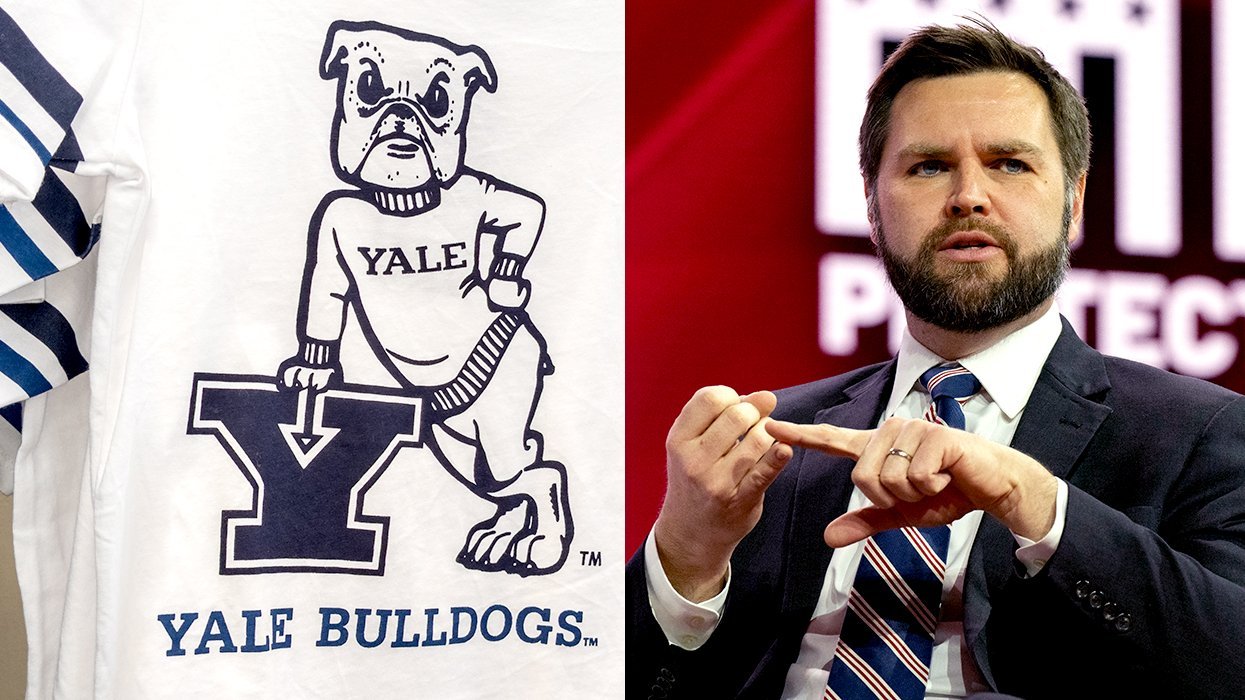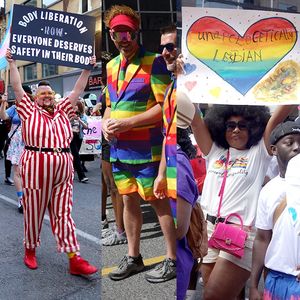CONTACTStaffCAREER OPPORTUNITIESADVERTISE WITH USPRIVACY POLICYPRIVACY PREFERENCESTERMS OF USELEGAL NOTICE
© 2024 Pride Publishing Inc.
All Rights reserved
All Rights reserved
By continuing to use our site, you agree to our Private Policy and Terms of Use.
Voters in Topeka, Kan., on Tuesday night upheld an ordinance banning discrimination against gays and lesbians in municipal hiring, rejecting a repeal movement led by Fred Phelps Sr., known for his local church's intense antigay pickets across the nation. And one of Phelps's granddaughters fell far short in her efforts to unseat an openly gay member of the Topeka city council. Phelps sought to remove from the books a city ordinance that prohibits discrimination against gays in municipal hiring. The repeal measure also would have barred Topeka from reinstating such protections for 10 years. The final unofficial results showed 53% opposed to the repeal, with 14,285 voting no and 12,795 voting yes. Phelps's granddaughter Jael Phelps was among three candidates challenging lesbian council member Tiffany Muller in a nonpartisan primary. Complete results showed Jael Phelps finishing a distant fourth and Muller second, allowing Muller to advance to an April 5 general election. Attorney Richard Harmon finished first and also advanced to the general election. After the vote, the senior Phelps dared the city council to consider another, broader ordinance and promised to continue his activities. Phelps was far from the only clergy member hoping to see the ordinance repealed. But other supporters of the effort--who viewed the ordinance as creating special rights for gays and lesbians--were frustrated in being tied to what they saw as Phelps's extreme rhetoric. "Phelps has established a reputation," said the Reverend Dr. Alan Benson, a pastor at two Topeka churches and the president of the local chapter of the National Association for the Advancement of Colored People. "I do not agree with him. God loves everybody." Matt Foreman, executive director of the National Gay and Lesbian Task Force, said the tie to Phelps was crucial in defeating the repeal effort. The Task Force said it provided staff, organized phone banks, and donated about $20,000 to the campaign against the effort. "This really was a question in every gay American's mind whether Fred Phelps represented the voters of Topeka," Foreman said. Voter Barry Elfant, 52, said he opposed repeal--but not because of Phelps. "The whole thing is just stupid--it's 2005," Elfant said. "I'm ashamed to be a resident of a community still struggling with these issues." Some voters who supported the repeal found the Phelps church's picketing offensive. Jim Paramore, a 65-year-old retired teacher, said he is "not for Fred Phelps." He said he voted to repeal the ordinance because "my feeling is that there doesn't need to be special consideration made for homosexuality." Muller, a 26-year-old grant writer, received national attention for her race because of the candidacy of Jael Phelps, a 20-year-old nursing student. Jael Phelps said she didn't mind the focus on her church's antigay picketing or its attempt to repeal the antidiscrimination ordinance. Muller, however, was frustrated because issues normally prominent in city races, such as creating jobs, weren't debated. And, Muller said, "there is never a final battle between the Phelpses and the gay community." The Washington-based gay rights group Human Rights Campaign said approval of the Phelps-backed proposal would have made Topeka the only American city with an ordinance blocking antidiscrimination policies for 10 years. The ballot measure was patterned after a Cincinnati ordinance adopted in 1993 but repealed last year. Last year, after the city council appointed Muller to fill a vacancy, she sought a broad antidiscrimination ordinance applying to private employment, housing, and public accommodations. When it became clear the council wouldn't approve it, she and other backers settled for a narrower ordinance in November. Only three local governments in Kansas have such an ordinance. One in Shawnee County applies only to government employment, but one in Lawrence, home of the University of Kansas, is broader. The senior Phelps and his Westboro Baptist Church then launched a petition drive against the ordinance. That wasn't surprising. His church began its antigay pickets more than a decade ago, with signs such as "God hates fags." Phelps's demonstration at the 1998 funeral of Wyoming beating victim Matthew Shepherd led to his portrayal in the play The Laramie Project. His targets include churches--even conservative ones--he deems too soft on homosexuality and labels "fag-enablers." He said he didn't care how the vote turned out because his job is to preach. "This fight has just barely begun," he said. Also supporting the ordinance's repeal were clergy who viewed it as a small step toward governmental acceptance of homosexuality. "We're always painted in Fred Phelps's camp," said the Reverend Bob Hanson, pastor at Topeka's Shawnee Heights Baptist Church. "We don't agree with his preaching and teaching. We don't agree with his signs." (AP)
Want more breaking equality news & trending entertainment stories?
Check out our NEW 24/7 streaming service: the Advocate Channel!
Download the Advocate Channel App for your mobile phone and your favorite streaming device!
From our Sponsors
Most Popular
Meet all 37 of the queer women in this season's WNBA
April 17 2024 11:24 AM
Here are the 15 gayest travel destinations in the world: report
March 26 2024 9:23 AM
21+ steamy photos of Scotland’s finest gay men in Elska Glasgow
February 01 2024 10:07 PM
More Than 50 of Our Favorite LGBTQ+ Moms
May 12 2024 11:44 AM
Conjoined twins Lori Schappell and trans man George Schappell dead at 62
April 27 2024 6:13 PM
Latest Stories
Chino Valley school district sues California over new law banning forced outing
July 18 2024 6:52 PM
Federal appeals court upholds Tennessee drag ban
July 18 2024 5:41 PM
While the Lord Almighty speaks to Biden, it’s time to prepare for Harris
July 18 2024 3:22 PM
Yemi Alade, Billy Porter and Omawumi to headline Global Black Pride 2024 in Atlanta
July 18 2024 2:57 PM
Ruby Corado, founder of LGBTQ+ nonprofit Casa Ruby, pleads guilty to wire fraud
July 18 2024 10:23 AM
Watch: GLAAD national ad features terrifying potential future under Project 2025
July 18 2024 9:00 AM
Trending stories
Most Recent
Recommended Stories for You



















































































